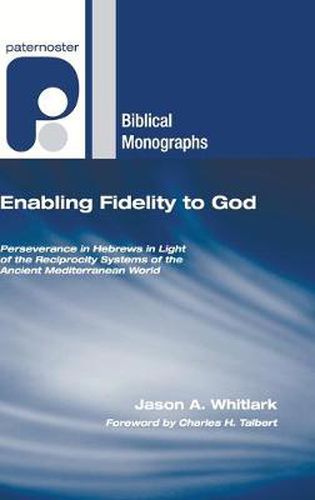Readings Newsletter
Become a Readings Member to make your shopping experience even easier.
Sign in or sign up for free!
You’re not far away from qualifying for FREE standard shipping within Australia
You’ve qualified for FREE standard shipping within Australia
The cart is loading…






The primary focus of this book is to demonstrate how Hebrews represents, in view of its historical and religious context, human fidelity to God. Thus, the basic thesis is twofold. First, with regard to the divine-human relationship in the ancient Mediterranean world, the belief in the reciprocity rationale was one primary dynamic for establishing fidelity to a relationship and has been applied by some scholars, such as David deSilva, to Hebrews as the way to understand its strategy for creating perseverance. A major problem with the application of this dynamic is that a common optimistic anthropological assumption is associated with the various reciprocity systems in the ancient world, both Jewish and pagan. This assumption is required if reciprocity is to be effective for establishing ongoing fidelity.
Second, there was, however, a middle Judaic stream that can be traced from the period of the exile which held to a pessimistic anthropology. This anthropological assumption crippled the perceived success of reciprocity to secure fidelity. Thus, the solution to God’s people’s inability to remain faithful was an act of God that transformed the human condition and enabled faithfulness to the relationship. The argument of this book is that Hebrews, with its emphasis upon the inauguration of the new covenant by Jesus’ high priestly ministry, belongs to this latter stream of thought in understanding how fidelity is secured between God and his people. Hebrews, thus, implicitly rejects the rationale of reciprocity for fidelity. The implications of this offers a fresh perspective on the soteriology of Hebrews.
$9.00 standard shipping within Australia
FREE standard shipping within Australia for orders over $100.00
Express & International shipping calculated at checkout
The primary focus of this book is to demonstrate how Hebrews represents, in view of its historical and religious context, human fidelity to God. Thus, the basic thesis is twofold. First, with regard to the divine-human relationship in the ancient Mediterranean world, the belief in the reciprocity rationale was one primary dynamic for establishing fidelity to a relationship and has been applied by some scholars, such as David deSilva, to Hebrews as the way to understand its strategy for creating perseverance. A major problem with the application of this dynamic is that a common optimistic anthropological assumption is associated with the various reciprocity systems in the ancient world, both Jewish and pagan. This assumption is required if reciprocity is to be effective for establishing ongoing fidelity.
Second, there was, however, a middle Judaic stream that can be traced from the period of the exile which held to a pessimistic anthropology. This anthropological assumption crippled the perceived success of reciprocity to secure fidelity. Thus, the solution to God’s people’s inability to remain faithful was an act of God that transformed the human condition and enabled faithfulness to the relationship. The argument of this book is that Hebrews, with its emphasis upon the inauguration of the new covenant by Jesus’ high priestly ministry, belongs to this latter stream of thought in understanding how fidelity is secured between God and his people. Hebrews, thus, implicitly rejects the rationale of reciprocity for fidelity. The implications of this offers a fresh perspective on the soteriology of Hebrews.